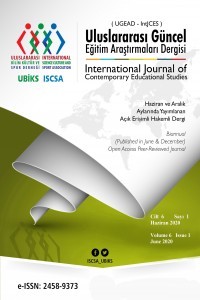Evaluations of Online Education Implementations From Students, Parents and Teachers Perspective During the Pandemic Period in Turkey
Covid-19, online education, school closure, mathematics, parents, teachers, students
___
- Al-Samarraie, H.,Teng, B. K., Alzahrani, A. I., & Alalwan, N. (2017). E-learning continuance satisfaction in higher education: A unified perspective from instructors and students. Studies in Higher Education, 43(11): 1–17.
- Berthelsen, D., & Walker, S. (2008). Parents’ involvement in their children’s education. Family Matters, 79: 34–41.
- Bokayev, B., Torebekova, Z., Davletbayeva, Z., & Zhakypova, F. (2021). Distance learning in Kazakhstan: estimating parents’ satisfaction of educational quality during the coronavirus. Technology, Pedagogy and Education, 30(1):27-39. https://doi.org/10.1080/1475939X.2020.1865192
- Chao, T., Saj, T., & Tessier, F. (2006). Establishing a quality review for online courses. Educause Quarterly, 29(3), 32–39.
- Clark-Wilson, A., Robutti, O., & Thomas, M. (2020). Teaching with digital technology. ZDM, 52(7): 1223–1242.
- Creswell, J. W. (2007). Qualitative inquiry and research design: Choosing among five approaches. Inc : SAGE Publications.
- Curtis, H. (2013). A mixed methods study investigating parental involvement and student success in high school online education [Unpublished PhD dissertation]. Northwest Nazarene University.
- Đurišić, M., & Bunijevac, M. (2017). Parental involvement as a important factor for successful education. Center for Educational Policy Studies Journal, 7(3): 137–153.
- Fiş Erümit, S. (2021). The distance education process in K–12 schools during the pandemic period: evaluation of implementations in Turkey from the student perspective. Technology, Pedagogy and Education, 30(1): 75-94 https://doi.org/10.1080/1475939X.2020.1856178
- Hebebci, M. T., Bertiz, Y., & Alan, S. (2020). Investigation of views of students and teachers on distance education practices during the Coronavirus (COVID-19) Pandemic. International Journal of Technology in Education and Science (IJTES), 4(4): 267–282.
- Jónsdóttir, K., Björnsdóttir, A., & Bæck, U. K. (2017). Influential factors behind parents’ general satisfaction with compulsory schools in Iceland. Nordic Journal of Studies in Educational Policy, 3(2): 155–164. https://doi.org/10. 1080/20020317.2017.1347012
- Khirwadkar, A., Khan, S. I., Mgombelo, J., Obradovic-Ratkovic, S., & Forbes, W. A. (2020). Reimagining Mathematics Education during the COVID-19 Pandemic. Brock Education: A Journal of Educational Research and Practice, 29(2): 42–46.
- Khlaif, Z. N., & Salha, S. (2020). The unanticipated educational challenges of developing countries in Covid-19 crisis: A brief report. Interdisciplinary Journal of Virtual Learning in Medical Sciences, 11(2): 130–134.
- Khlaif, Z. N., Salha, S., Affouneh, S., Rashed, H., & ElKimishy, L. A. (2020). The Covid-19 epidemic: teachers’ responses to school closure in developing countries. Technology, Pedagogy and Education, 30(1): 95-109. https://doi.org/10.1080/1475939X.2020.1851752
- Kong, S. C., Chan, T.-W., Huang, R., & Cheah, H. M. (2014). A review of e-learning policy in school education in Singapore, Hong Kong, Taiwan, and Beijing: Implications to future policy planning. Journal of Computers in Education, 1(2): 187–212.
- König, J., Jäger-Biela, D. J., & Glutsch, N. (2020). Adapting to online teaching during COVID-19 school closure: Teacher education and teacher competence effects among early career teachers in Germany. European Journal of Teacher Education, 43(4): 608–622.
- Mailizar, Almanthari, A., Maulina, S., & Bruce, S. (2020). Secondary school mathematics teachers’ views on e-learning implementation barriers during the Covid-19 pandemic: The case of Indonesia. Eurasia Journal of Mathematics, Science and Technology Education, 16(7): 1-9.
- McMahon, D. E., Peters, G. A., Ivers, L. C., & Freeman, E. E. (2020). Global resource shortages during COVID-19: Bad news for low-income countries. PLoS Neglected Tropical Diseases, 14(7): e0008412.
- MEB. (2021a, February 25). FATİH Projesi. Republic of Turkey Ministry of National Education, Innovation and Educational Technologies General Directorate. http://fatihprojesi.meb.gov.tr/
- MEB. (2021b, February 25). Sayılarla Uzaktan Eğitim. Republic of Turkey Ministry of National Education, Innovation and Educational Technologies General Directorate. http://yegitek.meb.gov.tr/www/sayilarla-uzaktan-egitim/icerik/3064
- MEB. (2021c, February 25). Eğitim Bilişim Ağı Sınıf Bazlı Zaman Çizelgesi. Republic of Turkey Ministry of National Education, Innovation and Educational Technologies General Directorate. http://www.eba.gov.tr/eba-sinif-bazli.html?canli=true
- Miles, M. B. & Huberman, A. (1994). Qualitative data analysis. USA: Sage Publication.
- Parmigiani, D., Benigno, V., Giusto, M., Silvaggio, C., & Sperandio, S. (2020). E-inclusion: online special education in Italy during the Covid-19 pandemic. Technology, Pedagogy and Education, 30(1): 111-124. https://doi.org/10.1080/1475939X.2020.1856714
- Patton, M. Q. (2002). Qualitative research and evaluation methods (3rd ed.). USA: Sage Publication.
- Reimers, F., & Schleicher, A. (2020). A framework to guide an education response to the COVID-19 pandemic of 2020. OECD. http://www.oecd.org/education/
- Selwyn, N., Nemorin, S., Bulfin, S., & Johnson, N. (2017). Left to their own devices: The everyday realities of one-to-one classrooms. Oxford Review of Education, 43(3): 289–310.
- Staker, H., & Horn, M. B. (2014). Blended learning in the K12 education sector. Blended learning: Research perspectives. In A. G. Piccino, C. D. Dziuban, & C. R. Graham (Eds.), Blended learning research perspectives (Vol. 2, pp. 287–300). Routledge.
- Starkey, L. (2020). A review of research exploring teacher preparation for the digital age. Cambridge Journal of Education, 50(1): 37–56.
- Tüysüz, C., & Çümen, V. (2016). Opinions of secondary school students about eba course website. Uşak Üniversitesi Sosyal Bilimler Dergisi, 9(3): 277–296.
- Yates, A., Starkey, L., Egerton, B., & Flueggen, F. (2020). High school students’ experience of online learning during Covid- 19: The influence of technology and pedagogy. Technology, Pedagogy and Education, 30(1): 55–69.
- Yin, R. K. (1994). Case study research: Design and methods (2nd ed.). USA: Sage Publishing
- Başlangıç: 2015
- Yayıncı: Uluslararası Bilim Kültür ve Spor Derneği (UBİKS)
Çevre Kirliliğinin Tarımsal Üretime Etkilerine İlişkin Öğretmen Adayı Görüşlerinin İncelenmesi
Sena Seçil GÜNGÖR, Esra ÇAKIRLAR-ALTUNTAŞ, Miraç YILMAZ
Ankara Üniversitesinde Eğitim Gören Öğrencilerin Fiziksel Aktivite Düzeylerinin İncelenmesi
Matematik Öğretiminde Yaratıcı Etkinliklerin Öğrenci Başarısına Etkisinin İncelenmesi
Rekreasyonda yaşam kalitesi ve fiziksel aktivitenin yeri ve önemi
Erdal ZORBA, Baglan YERMAKHANOV
Beden Eğitimi ve Spor Dersinin Değerler Eğitimine Katkısının İncelenmesi
Durdane İPEK EREN, Sibel ARSLAN
BEDEN EĞİTİMİ VE TIP ALANINDAKİ ÖĞRENCİLERİN SAĞLIKLI BESLENME TUTUMLARININ İNCELENMESİ
Gökmen KILINÇARSLAN, Akan BAYRAKDAR, Pelin AVCI
SPOR BİLİMLERİ FAKÜLTESİNDE OKUYAN AKTİF SPORCULARIN LİDERLİK ÖZELLİKLERİNİN BELİRLENMESİ
Ömer AKYÜZ, Mihri Barış KARAVELİOĞLU
Mustafa KARAKAYA, Bilgehan GÜLCAN
Çevrimiçi Uygulamalı Sanat Derslerinin Avantaj Ve Dezavantajlarına İlişkin Öğrenci Görüşleri
